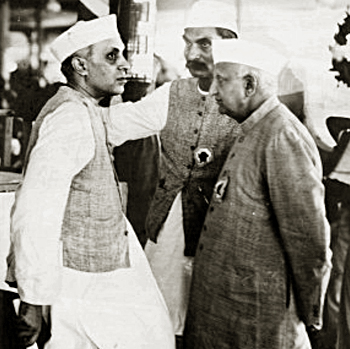 Desai - Liaquat pact of 1945 was a controversy which filled the vacuum in Indian politics at a time when all the eminent political leaders were in the jail after the Quit India Movement. This pact was signed between Bhlulabhai Desai, an eminent politician from Gujarat, who got associated with Indian National Congress after he represented the farmers of Gujarat during the Bardoli Satyagrah in 1928.
Desai - Liaquat pact of 1945 was a controversy which filled the vacuum in Indian politics at a time when all the eminent political leaders were in the jail after the Quit India Movement. This pact was signed between Bhlulabhai Desai, an eminent politician from Gujarat, who got associated with Indian National Congress after he represented the farmers of Gujarat during the Bardoli Satyagrah in 1928.
Desai being an eminent leader of Gujarat and a lawyer by profession, who at a later stage fought as defense lawyer for the convicted soldiers of Indian National Army, formally joined Indian National Congress in 1930. When during the Quit India Movement all other prominent political leaders were inside the jail, some of the leaders like Bhulabhai Desai were out of the jail demanding the release of all the political prisoners including Gandhi and Nehru. It was during this time that Desai tried to negotiate a pact with Liaquat Ali Khan, the second most prominent leader of Muslim League, making an effort for a future coalition government which would include the united members of both the parties. It aimed at representing the mutual demands of both the Hindus and Muslims. Within this deal Liaquqt Ali gave up his demand for a separate Muslim state on the return of the parity between Hindus and Muslims in the council of Ministers. Further Liaquat Ali accepted the equal representation of the minorities with the Hindu majority in the council of ministers. By considering the League as a Muslim majority and making an effort to give equal representation to Muslims along with the Hindu majority, Desai tries to construct an ideal Indian alliance which will bring the independence faster as well as end the Quit India Movement.
Reaction to Desai - Liaquat Pact
While Desai executed all this without the knowledge of Mahatma Gandhi as well as Jawaharlal Nehru, Liaquqt on his side too kept the deal a secret without the knowledge of Muhammad Ali Jinnah. It was only through the press that both the parties came to know about the pact which resulted in huge disagreement among the leaders. While Desai was condemned by all prominent leaders and was refused the tickets for Constitutional Assembly Elections on the health grounds; Liaquat Ali on the other hand rejected the entire pact and ridiculed it as a story. Bhulabhai Desai was also held responsible for loosing the war budget and was also rejected any support from the party which ruined his political carrier which came as fallout of Desai-Liaquat Pact.
Thus Desai - Liaquat Pact came as sudden event filling the vacuum during this period when Indian politics was at a halt having all its leaders behind the bars. This pact added some level of humiliation on the side of the Congress party which was at a very sensitive rather crucial moment of politics. Any slightest mistake on any side of the party meant total ruin for the entire freedom struggle. Nevertheless, this pact has still been mentioned and holds a relevant position in Indian politics which highlighted the strong role played by the then Congress leaders in Indian politics.






































